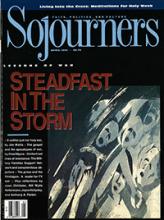The following sermon was preached at the worship service of Sojourners Community on Sunday, February 24, 1991, the day after the ground war began in the first Gulf War.
Our Old Testament reading this morning is the story of God's covenant with Abraham and Sarah. The Bible tells us that Abraham was from the town of Ur. Ur, we now know, is in modern-day Iraq. In fact, [before the first Gulf war] Secretary of Defense Richard Cheney told us that Saddam Hussein had Mig-21 combat aircraft parked next to the large pyramid at Ur, on the assumption that the United States has respect for ancient civilization and would not bomb that area.
A few weeks ago, our lectionary carried the story of Jonah, whom God commanded to go to the city of Ninevah and preach repentance. We know, of course, that Jonah was disappointed when the city did in fact repent; he had secretly hoped for its destruction. Ninevah, too, is in Iraq.
Biblical historians believe that the Garden of Eden was located between the Tigris and Euphrates rivers. Also modern-day Iraq.
The region now encompassing the nation of Iraq was known as an ancient "cradle of civilization." Here the wheel was invented, and an alphabet created.
The "Hanging Gardens of Babylon," within the borders of present-day Iraq, were considered one of the Seven Wonders of the World. In the months before the first Gulf war an effort had been undertaken to reconstruct the gardens, but progress was stopped by the war.
Read the Full Article

